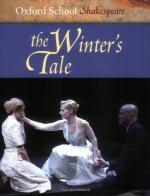Camillo.
I
cannot say ’tis pity
She lacks instruction; for she seems a mistress
To most that teach.
Perdita.
Your
pardon, sir; for this:
I’ll blush you thanks.
Florizel.
My
prettiest Perdita!—
But, O, the thorns we stand upon!—Camillo,—
Preserver of my father, now of me;
The medicine of our house!—how shall we
do?
We are not furnish’d like Bohemia’s son;
Nor shall appear in Sicilia.
Camillo.
My
lord,
Fear none of this: I think you know my fortunes
Do all lie there: it shall be so my care
To have you royally appointed as if
The scene you play were mine. For instance, sir,
That you may know you shall not want,—one
word.
[They talk aside.]
[Re-enter autolycus.]
Autolycus. Ha, ha! what a fool Honesty is! and Trust, his sworn brother, a very simple gentleman! I have sold all my trumpery; not a counterfeit stone, not a riband, glass, pomander, brooch, table-book, ballad, knife, tape, glove, shoe-tie, bracelet, horn-ring, to keep my pack from fasting;—they throng who should buy first, as if my trinkets had been hallowed, and brought a benediction to the buyer: by which means I saw whose purse was best in picture; and what I saw, to my good use I remembered. My clown (who wants but something to be a reasonable man) grew so in love with the wenches’ song that he would not stir his pettitoes till he had both tune and words; which so drew the rest of the herd to me that all their other senses stuck in ears: you might have pinched a placket,—it was senseless; ’twas nothing to geld a codpiece of a purse; I would have filed keys off that hung in chains: no hearing, no feeling, but my sir’s song, and admiring the nothing of it. So that, in this time of lethargy, I picked and cut most of their festival purses; and had not the old man come in with whoobub against his daughter and the king’s son, and scared my choughs from the chaff, I had not left a purse alive in the whole army.
[Camillo, Florizel, and Perdita come forward.]
Camillo.
Nay, but my letters, by this means being there
So soon as you arrive, shall clear that doubt.
Florizel.
And those that you’ll procure from king Leontes,—
Camillo.
Shall satisfy your father.
Perdita.
Happy
be you!
All that you speak shows fair.
Camillo.
[Seeing autolycus.] Who have we here?
We’ll make an instrument of this; omit
Nothing may give us aid.
Autolycus.
[Aside.] If they have overheard me now,—why,
hanging.
Camillo.
How now, good fellow! why shakest thou so? Fear
not, man; here’s
no harm intended to thee.




